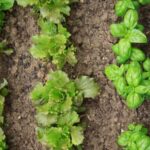Using organic fertilizers in vegetable gardens is essential for promoting healthy plant growth and ensuring the production of nutrient-rich crops. One common organic fertilizer that is highly regarded for its effectiveness is black cow manure. Many gardeners swear by the benefits of using black cow manure to improve soil fertility and enhance vegetable yields.
But is black cow manure really good for vegetable gardens? In this article, we will delve into the composition, benefits, and proper usage of black cow manure to help you understand its potential impact on your own vegetable garden.
Black Cow manure is a natural fertilizer made from composted cow dung, which is rich in essential nutrients like nitrogen, phosphorus, and potassium. This organic material has long been favored by gardeners for its ability to enhance soil structure, increase microbial activity, and provide a slow-release source of nutrients for plants. When used properly, it can significantly improve the overall health and productivity of your vegetable garden.
In the following sections, we will explore the specific benefits of using black cow manure in vegetable gardens, provide practical guidance on how to incorporate it into your gardening routine, address any misconceptions surrounding its use, and offer tips for maximizing its effectiveness. Additionally, we will compare black cow manure to other types of organic fertilizers to help you determine if it is the best choice for your gardening needs.
Whether you are a seasoned gardener or just starting out, understanding the importance of using organic fertilizers like black cow manure can make a significant difference in the success of your vegetable garden.
What Is Black Cow Manure
Black cow manure is a type of organic fertilizer that is derived from cow dung. It is rich in essential nutrients such as nitrogen, phosphorus, and potassium, making it an excellent choice for enriching the soil in vegetable gardens. Unlike chemical fertilizers, black cow manure is natural and does not contain any harmful chemicals that can potentially damage the soil or harm the plants.
Composition of Black Cow Manure
Black cow manure is composed of a mixture of decomposed organic matter, cow dung, and urine. This combination results in a nutrient-rich fertilizer that provides essential elements for plant growth. The decomposed organic matter in black cow manure also helps improve soil structure by enhancing its water-holding capacity and promoting beneficial microbial activity.
Benefits of Using Black Cow Manure in Vegetable Gardens
One of the main benefits of using black cow manure in vegetable gardens is its ability to enhance soil fertility. The nutrients present in the manure promote healthy plant growth, leading to bountiful harvests of fresh vegetables. Additionally, black cow manure aids in improving the overall health of the garden by fostering a balanced ecosystem with beneficial microorganisms that support plant growth and disease resistance.
Another advantage of black cow manure is its environmentally friendly nature. Since it is an organic fertilizer, it does not pose any harmful effects on the environment or contribute to pollution. Therefore, using black cow manure aligns with sustainable gardening practices that prioritize natural and eco-friendly solutions for nourishing plants.
Benefits of Using Black Cow Manure in Vegetable Gardens
Black cow manure is an excellent organic fertilizer that can greatly benefit vegetable gardens. This type of manure is derived from the waste produced by cows, and it is rich in essential nutrients that are beneficial for plant growth. In addition to providing a source of nutrients, black cow manure also helps improve soil structure and fertility, making it an ideal choice for gardeners looking to cultivate healthy and productive vegetable plants.
Composition and Benefits
Black cow manure is composed of a mixture of cow dung, urine, and bedding materials such as straw or hay. This combination provides a balanced blend of nitrogen, phosphorus, potassium, and other micronutrients that are essential for plant growth. The organic matter in black cow manure also helps improve soil structure by increasing its water-holding capacity, enhancing aeration, and promoting the activity of beneficial microorganisms.
Furthermore, black cow manure releases nutrients slowly over time, which can help maintain a steady supply of nourishment for vegetable plants throughout their growing season. This slow-release characteristic reduces the risk of nutrient runoff and leaching, making it an environmentally friendly option for fertilizing vegetable gardens.
Improving Soil Fertility
When incorporated into the soil, black cow manure works to enhance soil fertility by replenishing important nutrients that may have been depleted due to previous crop cycles or environmental factors. The organic matter present in the manure also acts as food for soil organisms such as earthworms and beneficial bacteria, further contributing to improved soil health.
Overall, the use of black cow manure can result in increased plant vigor, higher yields, and better overall crop quality in vegetable gardens. Its ability to enhance soil fertility while providing a slow-release source of essential nutrients makes it an excellent choice for gardeners seeking sustainable and effective ways to nourish their crops.
How to Use Black Cow Manure in Vegetable Gardens
Using black cow manure in vegetable gardens is an excellent way to improve soil fertility and promote healthy plant growth. To achieve the best results, it is important to properly incorporate the manure into the garden soil. Here are some step-by-step instructions on how to use black cow manure effectively:
- Prepare the soil: Before applying black cow manure, it is essential to prepare the soil. This may include removing any weeds, loosening the soil with a rake or garden fork, and ensuring that the area is free from debris.
- Apply the manure: Once the soil is prepared, evenly spread a layer of black cow manure over the garden bed. The amount of manure needed will depend on the size of the area and the specific needs of the plants being grown.
- Incorporate into the soil: After applying the manure, use a rake or garden fork to thoroughly mix it into the top few inches of soil. This will help distribute the nutrients and organic matter throughout the planting area.
It is important to note that while black cow manure can provide many benefits to vegetable gardens, it should be used in moderation. Excessive application can lead to an imbalance of nutrients in the soil, which may have negative effects on plant health. Additionally, it is recommended to avoid using fresh, undecomposed manure directly on plants as this can burn their roots.
When used correctly, black cow manure can be a valuable addition to any vegetable garden. Its nutrient-rich composition can improve soil structure, enhance moisture retention, and support overall plant vitality. By following these step-by-step instructions for incorporating black cow manure into garden soil, gardeners can maximize its benefits and enjoy healthier, more productive crops.
Common Misconceptions About Black Cow Manure
When it comes to using organic fertilizers in vegetable gardens, black cow manure is often a popular choice. However, there are some common misconceptions and concerns that might arise when considering the use of this type of manure. It’s important to address these misconceptions and provide clarity on the benefits of using black cow manure in vegetable gardens.
One common misconception is that black cow manure will smell bad and attract pests. However, when properly composted, black cow manure should have a minimal odor and will not attract any more pests than other types of organic fertilizers.
Additionally, some gardeners may worry that using black cow manure will introduce harmful pathogens or weed seeds into their soil. In reality, high-quality commercial sources of black cow manure should be properly aged and processed to eliminate any potential harmful elements.
Another concern that gardeners might have is whether using black cow manure will cause an imbalance in the soil pH. While it’s true that fresh manure can temporarily raise the pH level of the soil, properly composted black cow manure is balanced in terms of nutrients and pH levels. It can actually help improve overall soil fertility over time.
To address these concerns and myths about black cow manure in vegetable gardens, here are some important points to keep in mind:
- Properly composted black cow manure is odorless and should not attract pests.
- High-quality sources of black cow manure are free from harmful pathogens and weed seeds.
- Composted black cow manure is balanced in nutrients and pH levels, making it a safe and effective option for improving soil fertility.
By understanding these points, gardeners can feel confident in using black cow manure to enhance the health and productivity of their vegetable gardens.
Tips for Maximizing the Benefits of Black Cow Manure
Black cow manure is an excellent organic fertilizer that can provide numerous benefits to vegetable gardens. This type of manure is a rich source of essential nutrients and organic matter that can improve soil fertility and promote healthy plant growth. However, in order to maximize the benefits of black cow manure, there are certain tips and insights that gardeners should keep in mind.
One important tip for getting the best results from using black cow manure in vegetable gardens is to properly compost the manure before applying it to the soil. Composting the manure helps to break down any potential pathogens, weed seeds, and odors while also accelerating the release of nutrients.
This process can take several weeks or even months, so it’s important to plan ahead and start composting the black cow manure well in advance of when it will be needed in the garden.
Another useful insight for maximizing the benefits of black cow manure is to consider using it in conjunction with other organic fertilizers and soil amendments. Combining black cow manure with materials such as compost, bone meal, or blood meal can create a well-balanced mix of nutrients that will support optimal plant growth. Additionally, adding organic matter like shredded leaves or straw to the soil along with the black cow manure can further improve soil structure and water retention.
Lastly, it’s important to apply black cow manure at the right time and in the right amount. Generally, it is recommended to add around 1-2 inches of composted black cow manure to the topsoil before planting vegetables.
It’s best to avoid over-applying the manure, as this can lead to nutrient imbalances or excessive salt build-up in the soil. By following these tips and insights, gardeners can ensure that they are making the most out of using black cow manure in their vegetable gardens.
| Tips for Maximizing Benefits | Insights |
|---|---|
| Properly compost black cow manure before application | Accelerates release of nutrients |
| Combine with other organic fertilizers & amendments | Creates balanced mix of nutrients |
| Apply at right time & amount | Avoid over-application for nutrient balance |
Comparing Black Cow Manure to Other Types of Organic Fertilizers
Black cow manure, also known as composted cow manure, has been a popular choice for organic gardeners. It is rich in nutrients such as nitrogen, potassium, and phosphorus, making it an excellent natural fertilizer for vegetable gardens. One of the main benefits of black cow manure is its ability to improve soil structure and fertility, leading to healthier and more productive plants.
When compared to other types of organic fertilizers, black cow manure stands out due to its high nutrient content and versatility. Unlike synthetic fertilizers that may contain harmful chemicals, black cow manure is completely natural and safe for use in vegetable gardens. Its slow release of nutrients also helps prevent nutrient leaching and ensures a steady supply of essential elements for plant growth.
Moreover, black cow manure is cost-effective and easily accessible for gardeners. Many farmers or gardening centers sell bags or bulk quantities of composted cow manure at affordable prices, making it a practical choice for those looking to improve the health of their vegetable plants without breaking the bank.
In addition to its nutritional benefits and cost-effectiveness, using black cow manure in vegetable gardens promotes environmentally friendly and sustainable practices. By utilizing natural fertilizers like black cow manure instead of synthetic alternatives, gardeners contribute to the overall health of the ecosystem while reaping the rewards of bountiful harvests.
| Advantages of Black Cow Manure | Other Options |
|---|---|
| Natural and safe for use in vegetable gardens | Potential presence of harmful chemicals in synthetic fertilizers |
| High nutrient content (nitrogen, potassium, phosphorus) | Varying nutrient levels depending on the type of organic fertilizer |
| Affordable and easily accessible | Some organic fertilizers may be costly or difficult to obtain |
Conclusion
In conclusion, black cow manure is indeed a valuable organic fertilizer for vegetable gardens. As discussed in this article, its composition and benefits make it an excellent choice for improving soil fertility and promoting plant growth. By incorporating black cow manure into garden soil, gardeners can provide essential nutrients to their plants while also enhancing the overall health of the garden ecosystem.
When it comes to using black cow manure in vegetable gardens, following proper application techniques is crucial. By carefully integrating the manure into the soil and adhering to recommended usage rates, gardeners can maximize the benefits of this organic fertilizer while minimizing any potential drawbacks. It is important to remember that using black cow manure should be part of a comprehensive approach to gardening, which includes proper watering, weed control, and plant maintenance.
In essence, choosing black cow manure for vegetable gardens is a sustainable and effective way to nurture healthy and productive plants. Its natural composition and numerous benefits make it an ideal option for both experienced and novice gardeners looking to enhance their gardening practices with organic fertilizers. By understanding the value of black cow manure and implementing best practices for its use in their gardens, gardeners can create thriving ecosystems that yield bountiful harvests season after season.
Frequently Asked Questions
Is Black Cow Manure Safe for Vegetable Gardens?
Black cow manure can be safe for vegetable gardens as long as it has been properly composted to kill any harmful pathogens. It can provide valuable nutrients to the soil, but it’s important to use it in moderation.
What Vegetables Don T Like Cow Manure?
Some vegetables, such as root crops like carrots and potatoes, may not thrive with too much cow manure in the soil. This is because an excess of nitrogen from fresh manure can cause the development of misshapen or forked roots.
Can I Mix Cow Manure in My Vegetable Garden?
It is possible to mix cow manure into your vegetable garden, but it’s essential to do so carefully. Composted or aged cow manure is best, as it reduces the risk of burning plant roots and helps improve soil structure and fertility. Just ensure that you’re not overdoing it with the cow manure, as moderation is key.

If you’re looking to get into vegetable gardening, or are just looking for some tips on how to make your current garden better, then you’ve come to the right place! My name is Ethel and I have been gardening for years. In this blog, I’m going to share with you some of my best tips on how to create a successful vegetable garden.





